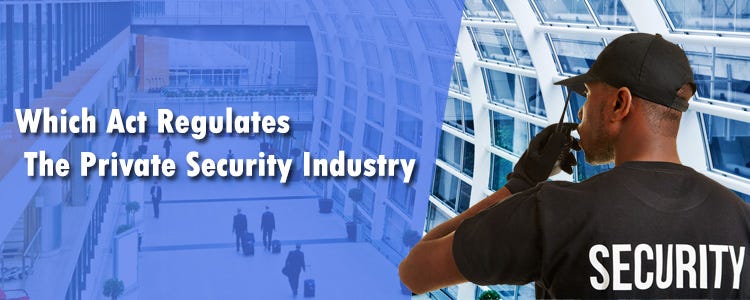Which Act Regulates The Private Security Industry?
Photo Post
11 Mar, 2019
As a developing country, India is witnessing growth in various sectors of business and merchandise. One such sector is of Private Security Agencies. It is a booming sector which has tremendous potential in the coming days.
According to a report published by FICCI-Grant Thornton, the Private Security sector in India is about to grow exponentially at the rate of 20% over the next few years and has the potential to become 800 billion worth by 2020. It is going to play a very big role as an employment generator in India in the coming years. You can read further of the report in the link: the booming enterprise of private security
Why is the Private Security sector suddenly taking such a tremendous form?
As I said earlier, India is a developing nation. We are on the verge of far greater developments compared to the last couple of years, and so new and advanced businesses are taking shapes in our nation.
New organizations are forming, corporations planting their feet and a lot of infrastructure being built. All of it needs security. And government security agencies are not able to provide that kind of focused and advanced personal security. They are public servants and can’t actually stand and guard particular private buildings or persons all day. Hence the need for Private Security Agencies.
So how does a Private Security firm shape up? What is the process and what law regulates these Private Agencies?
- The Government of India passed an act to govern the formation and working of such Private Agencies providing security in any form in 2005.
- It provides a framework for this industry to be worked on and followed by them.
- The act is Private Security Agencies (Regulation) Act and it governs all the laws and licenses issued by the government to start a business in this sector.
- Whether the Private Security Agency is training security guards or providing armored car service or security guards it needs a license under PSARA.
- Now the license under the PSARA act can only be issued by the Controlling Authority of the state. It is a designation that can only be filled by a person holding the rank of Joint Secretary in the Home Department of the State or above or an equivalent officer.
- The Controlling Authority is responsible for the issuance, renewal, and regulation of the operation of these Private Security Agencies.
- Further, a NOC is passed by the concerning police authorities of the state and then it is in the hands of the Controlling Authority to pass or deny the license by giving a reason.
- After a license has been issued the Security Agency is obliged to start its operation in 60 days.
The act also states that if the agency is a company then the majority shareholder must be an Indian. There are further pre-requisites like uniforms and health conditions and training of the guards for being the owner of such an agency or company which you can check out in the link at the end of the article.
Then comes the registration process which demands the business model of the organization to be verified. It should state the resource management of the organization. The model can be solely proprietary or an NGO or a partnership firm etcetera.
After the registration one can apply for the license. Various documents and affidavits are needed to be filled which can be found in the link. After all the necessary documents are ready, one is ready to apply for the license. An application fee is to be submitted with the form which fluctuates from state to state.
This is how a Private Security Firm is governed by the PSARA act in India.
You can read all about the PSARA act in the following link.
The link: rules and regulations concerning private security agencies, how to apply for a license etc.
Read Also,
Originally published at securitytroops.com on March 11, 2019.

Comments
Post a Comment